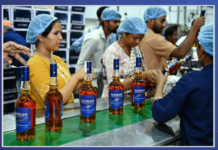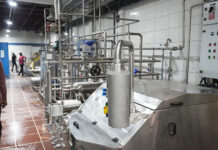
Sabic has leveraged its successful ties with Polivouga, a manufacturer of flexible film products with operations in Portugal, to launch a new innovative Trucircle project designed to reuse post-consumer plastic waste recovered from areas up to 50km inland from waterways that has the potential to end up in our rivers and oceans. The collaboration with the Nueva Pescanova, a Spanish brand owner specializing in the fishing, farming, processing and marketing of fresh, chilled and frozen seafood products, has resulted in the development of the world’s first frozen food packaging solution using Sabic’s certified circular polyethylene from feedstock sourced from ocean-bound plastic. The new sustainable packaging will be launched to coincide with World Oceans Day 2022.
The ocean-bound plastic is converted using advanced recycling into an alternative feedstock which SABIC uses to produce certified circular polymers – SABIC LLDPE (Linear Low Density Polyethylene) and LDPE (Low Density Polyethylene) for further processing to flexible packaging film by Polivouga. Then, Nueva Pescanova packages its frozen seafood in bags made from this film.
The collaboration is Sabic’s first Trucircle project using recycled ocean-bound plastic in certified circular polyethylene. Sami Al-Osaimi, vice-president PE and Sales at Sabic stated that, “This is an exciting circular packaging solution for us, since it demonstrates how used plastic that has the potential to end up in our oceans, can be brought back into a circular material stream to be converted into high-quality food packaging. It also underlines Sabic’s commitment to the United Nations’ Strategic Development Goal 14 for ‘Life Below Water.” He added, “The results once again demonstrate the art of the possible when dedicated value chain partners collaborate with the aim of making a difference.”
Ignacio González, chief executive officer of the Nueva Pescanova Group, “As a seafood company, it is our great responsibility to care for the seas and oceans, the ecosystems on which our activity depends and which we must all take care of together. With this initiative, we will prevent this plastic waste from reaching the marine environment, giving them a new life. We have set ourselves the goal of making 100% of our packaging recyclable by 2025 and, through this action, we will be one step closer to achieving this.”
The ocean-bound plastic-based solution is fully certified under the Zero Plastic Oceans program and the International Sustainability and Carbon Certification (ISCC) plus chain of custody. This means that the material flow is controlled and tracked from the ocean-bound plastic to the final packaging following a set of predefined and transparent rules.
“The project reaffirms the determined journey we have embarked on with Sabic to drive circularity in our industry and takes it one step further, enabling us to provide our customers with premium flexible film products now also based on mixed plastic waste that could otherwise pollute our seas and waterways,” adds Tiago Barros, chief executive officer at Polivouga. “Besides delivering a food-contact approved polyolefin product, these ocean-bound plastic PE films ensure the same tear and puncture resistance as competing PE packaging structures made from virgin fossil PE resins.”
Sabic’s certified circular polymers form part of the company’s Trucircle portfolio and services for circular solutions. The offering also includes design for recyclability, mechanically recycled products, certified renewable polymers from bio-based feedstock and closed-loop initiatives to recycle plastic back into high-quality applications and help prevent valuable used plastics from becoming waste.
IndiFoodBev — authentic, impactful and influential
An English-language food and beverage processing and packaging industry B2B platform in print and web, IndiFoodBev is in its third year of publication. It is said that the Indian food and beverage industries represent approximately US$ 900 billion in revenues which implies more than 20% of the country’s GDP. Eliminating the wastage on the farmside can help to deliver more protein to a higher number of the population apart from generating sizable exports. The savings in soil, seeds, water, fertilizer, energy and ultimately food and nutrition could be the most immense contribution that country is poised to make to the moderation of climate change.
To improve your marketing and grow sales to the food and beverage processing and packaging industry, talk to us. Our research and consulting company IppStar [www.ippstar.org] can assess your potential and addressable markets in light of the competition. We can discuss marketing, communication, and sales strategies for market entry and growth.
Suppliers and service providers with a strategy and budget for targeted marketing can discuss using our hybrid print, web, video, and social media channels to create brand recognition linked to market relevance. Our technical writers are ready to meet you and your customers for content.
The second largest producer of fruit and vegetables in the world is continuously expanding processing capacities and delivery systems with appropriate innovative technologies. We cover product and consumer trends, nutrition, processing, research, equipment and packaging from farm to thali. Get our 2025 media kit and recalibrate your role in this dynamic market. Enhance your visibility and relevance to existing markets and turn potential customers into conversations. Ask for a sample copy of our bi-monthly in print or our weekly IndiFoodBev eZine each Wednesday.
For editorial info@ippgroup.in — for advertisement ads1@ippgroup.in and for subscriptions subscription@ippgroup.in
Naresh Khanna – 10 February 2025
Subscribe Now










